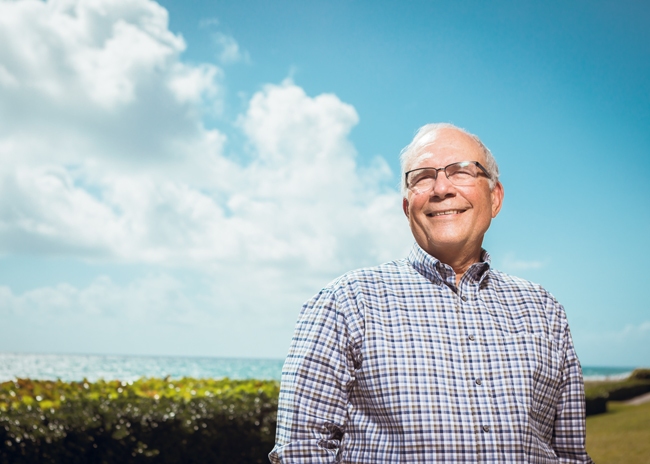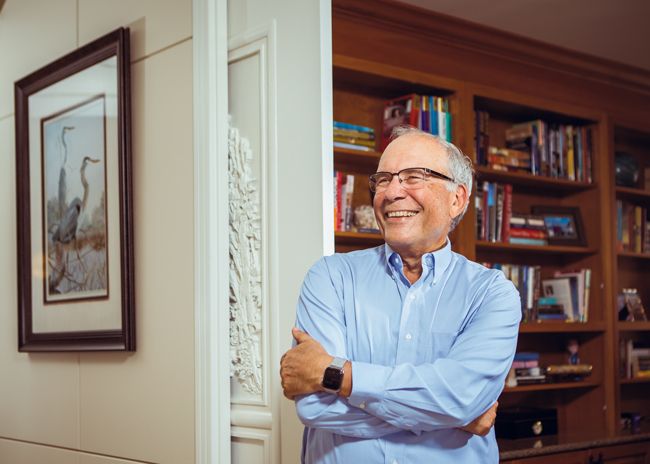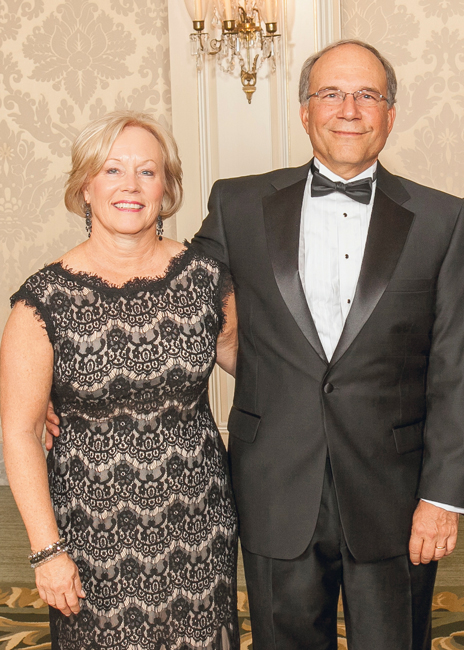Turning Entrepreneurial Spirit into Real Success
 Photography by Sonya RevellIt’s far too easy to write off Fred Clark’s success as just that of a guy who took over a family business, had some lucky breaks and hit it big. Upon closer examination, Fred Clark, chairman and founder of Clark Associates in Lancaster, Pa., and winner of the 2022 FE&S Hall of Fame Award, is a savvy, thoughtful business leader who has used a combination of entrepreneurial spirit, shrewd risk-taking and smart hiring practices to elevate his company to the top of the industry. Reported annual sales totaled $2.6 billion in 2021, marking a 48% increase from 2020 sales. That secures Clark Associates’ spot as the largest foodservice equipment and supplies dealer in the U.S. for the second year in a row according to the FE&S 2022 Distribution Giants study. Serving virtually every segment of both commercial and noncommercial foodservice, Clark Associates has five main distribution channels: The WebstaurantStore (e-commerce), Clark Food Service Equipment and Clark Pro (the more traditional dealership model), Clark National Accounts (for multiunit operators), The Restaurant Store (cash and carry), plus 11400 Inc. (public hard bid).
Photography by Sonya RevellIt’s far too easy to write off Fred Clark’s success as just that of a guy who took over a family business, had some lucky breaks and hit it big. Upon closer examination, Fred Clark, chairman and founder of Clark Associates in Lancaster, Pa., and winner of the 2022 FE&S Hall of Fame Award, is a savvy, thoughtful business leader who has used a combination of entrepreneurial spirit, shrewd risk-taking and smart hiring practices to elevate his company to the top of the industry. Reported annual sales totaled $2.6 billion in 2021, marking a 48% increase from 2020 sales. That secures Clark Associates’ spot as the largest foodservice equipment and supplies dealer in the U.S. for the second year in a row according to the FE&S 2022 Distribution Giants study. Serving virtually every segment of both commercial and noncommercial foodservice, Clark Associates has five main distribution channels: The WebstaurantStore (e-commerce), Clark Food Service Equipment and Clark Pro (the more traditional dealership model), Clark National Accounts (for multiunit operators), The Restaurant Store (cash and carry), plus 11400 Inc. (public hard bid).
First Steps into Foodservice
Fred Clark’s career did not follow the path of many other industry leaders: going to college, obtaining an advanced degree at business school, and then bouncing from company to company, climbing upward on the management tree. Upon leaving high school in 1976, he worked as an electrician and repairman for G/L Clark Associates, the electrical contracting firm in Hatville, Pa., operated by his father, Lloyd Clark, and his uncle, Glenn Clark. “In the ’60s and ’70s, the tourist industry was taking off in Lancaster Country because we have the Amish here,” Fred Clark relates. “There were a lot of large, family-style restaurants.” Since gas lines were less prevalent in the rural area around Lancaster, most of those restaurants had electric cooking equipment. “We were the local electrician of eastern Lancaster County. We’d work on steamers, convection ovens and so forth. My uncle did a lot of service work on the equipment in the beginning. Then I learned to do service work on the equipment,” he says.
Fred Clark got his first experience in procurement when clients’ equipment would break down. He would drive into Philadelphia’s Second Street district, where, as he says, “there were about 12 distributors in a 2-block area. I would go down there, go between the distributors, buy a piece of equipment, truck it down to Lancaster and sell it.” Selling then became a logical extension of the equipment repair business: “People bought [equipment] from us because we serviced it. Back then, that was a lot more common than it is today,” he says. With the experience he gained in buying equipment on Second Street, Clark began taking on some kitchen design jobs, which included purchasing equipment directly from the manufacturers. At that point, he says, “we became a total foodservice contractor.”
Now in the design and equipment buying business, the next step for Fred Clark was to handle the installation as well. “As we were installing, I was like, we might as well start selling smallwares too because [customers] always wanted china, glassware and other supplies,” he says. From there it was a logical step to selling other items, like paper products, and by 1978, Clark Food Service Equipment was open for business. In 1993, he became company president.
Today, besides selling a full range of foodservice products, Clark Food Service Equipment offers equipment sales, design and contracting services, as well as turnkey construction services. Along with its Lancaster headquarters, the company has 18 distribution centers in 8 states around the U.S.
A Multiple-Company Success Story
But Clark Food Service Equipment is just one part of the overall success story of Clark Associates. Fred Clark saw an opening in the market for a cash-and-carry operation. So in 1993, the company opened its first brick-and-mortar location, called The Restaurant Store, in Lancaster.
“Nobody was doing it at that time,” Fred Clark says, “but it made a lot of sense to me. I learned that idea from Gus Gustafson [founder of Ace Mart Restaurant Supply in San Antonio and the 2007 recipient of the FE&S Hall of Fame Award]. He was definitely a mentor to me in the early years. The main thing he taught me was that I’d rather [have] money in inventory than in receivables, and being in the traditional distribution business, we had lots of receivables. So I started a cash-and-carry business.”
 Fred Clark now works primarily from his Florida residence.
Fred Clark now works primarily from his Florida residence.
There was a simple reason for calling the new venture The Restaurant Store and not giving it the Clark moniker. Clark Food Service Equipment, Fred Clark says, “is all about service, high touch, a high level of service. You have to get a certain price for that level of service.” A cash-and-carry model provides a different level of service to customers, he says. “If they’re going to deal with The Restaurant Store, they’re going to deal with a store. They’re not getting the level of service they get with Clark.” But the synergies between the two companies can be leveraged, he adds. Customers who want something more than what The Restaurant Store can provide are advised that if they “want that level of service, you really need to call up Clark Food Service Equipment,” he says. “That’s who will take care of you.” There are now 11 Restaurant Store locations scattered across the Northeast.
When developing a name for the company’s online sales platform, Fred Clark followed an approach similar to the one taken when starting the cash-and-carry business. As a result, Clark Associates Inc.’s successful online sales platform is called the WebstaurantStore.
In the early 2000s, Fred Clark noticed a few restaurant equipment websites popping up online, and in his typical entrepreneurial spirit, decided to stick his toe in the water with the webstaurantstore.com website. “While on college summer break, my son Gene put up web pages for about 200 pieces of equipment online,” Fred Clark relates. “By the time he went back to school in August, we thought, there’s something to this. So we added a few items and then a few more items.” Soon, he says, “we were selling fryers into South Dakota and ranges into Utah. You just didn’t think about that back then. It was such a small world.”
Gene Clark, currently the CEO of Clark Associates, describes the shoestring web startup: “We didn’t hire a big, fancy company to write some enormous website for us. It was us in the backroom, taking photos of our product, scrapping together a site ourselves and shipping the boxes out of the back of our restaurant store. That’s kind of our approach — starting small, incremental and scrappy.”
A smaller but nevertheless important part of Clark Associates is 11400 Inc., aimed at businesses based on competitive bidding, such as schools, hospitals and the military. Founded in 2008, it’s named for the section of the American Institute of Architects spec documents that refers to foodservice equipment. While the name might seem enigmatic to an outsider, “anybody in the contract business knows exactly what that number means,” Clark says. 11400 offers a start-to-finish range of services, from custom millwork and fabrication to equipment acquisition to installation.
 This photo montage shows the development of Clark Associates through the years, including the main distribution center today in Lancaster, Pa., and some early images from the company’s inception.
This photo montage shows the development of Clark Associates through the years, including the main distribution center today in Lancaster, Pa., and some early images from the company’s inception.
A Unique Management Style
If there’s one word that sums up Fred Clark, it’s “entrepreneurial.” He calls himself, laughingly, “a serial entrepreneur.” That spirit has stayed with him throughout his career, from the first steps into foodservice back in the ’70s to the present day.
Fred Clark has always considered the fact that he didn’t have a strong background in foodservice to be an advantage. “My dad wasn’t in foodservice,” he says. “I never had an older generation saying, ‘That’s the way we’ve always done it. That’s the way we do things.’ I was first-generation foodservice, so I just tried things. I didn’t know any better.” With no one looking over his shoulder, Fred Clark would often take business risks, claiming he has “an extremely high-risk tolerance.” He readily admits, however, that not everything he tried worked. “You’re only hearing about my successes. You could write another whole article on my failures,” he laughs.
The one thing Fred Clark knew innately, however, was that bureaucracy was a success-killer for his company. “Bureaucracy is just a natural evolution that almost all companies go through,” he says. “It’s openly discussed [at Clark because] the more we discuss it, the less chance it has of getting its way in. Being able to talk about bureaucracy is what’s going to keep us from falling into the pit that many large corporations do.” He points to some of the struggling behemoths such as Sears and General Electric as being indicative of how bureaucracy can hamper a company’s growth: “Look at General Electric: what it grew to, what it was, and the levels of bureaucracy they had.”
To Fred Clark, knowing one’s weaknesses are just as important as knowing one’s strong points. In a video shot for Clark Associates’ 50th anniversary in 2021, he summed up his philosophy this way: “You’ve got to know what you don’t know. I know what I don’t know, and it doesn’t bother me.” He put that theory into practice with his hiring decisions. “It’s very simple. I hired smart, hardworking people, and I taught them how to hire smart, hardworking people,” he says. “That just perpetuates and goes on and on.”
Fred Clark uses the head of all technology at Clark Associates, chief information officer Charlie Garber, as an example. “I have no idea what that guy does, but it’s very important what he does. So [in] those areas that I know nothing about, if I’ve got the right people there, I don’t worry about it.” The right people don’t necessarily have to have a foodservice background, he says. In fact, “I’ve never hired a competitor’s person.
I don’t want them. They come with bad habits.”
A college degree isn’t necessarily required either. “The last I checked, there is not a degree in the restaurant supplies industry that you can get. In our field, the only way you learn this industry is working it day to day. You’ve got to work beside somebody who knows the industry, knows the items. Knowledge is so important, and there’s just no place to go to school to learn this.”
In 2020, Fred Clark turned over the reins of Clark Associates to his son Gene Clark and assumed the position of chairman. Unlike a traditional chairman, who might take on an advisory role, Fred Clark is now tasked with growing the company’s vertical integration. The COVID-19 pandemic, he says, “really brought supply chain issues to light. We had to work so hard to get product in [during] those times. So what I’m basically doing is finding small manufacturing operations that manufacture items that we sell. It might be a small company of 7, 8 or 20 employees, and they make something we sell in our private labels.” He is personally providing the funding for these startups: “I’m funding and building them personally. This isn’t part of Clark, but Clark is their only customer, and eventually it’ll be rolled into the whole Clark family.”
Fred Clark admits it was tough leaving the CEO position, but he was confident in his hiring decisions. “I taught them how to hire, and I just had to get the hell out of their way because they are much better at managing a company of this size. I knew it was time for the transition and time for me to step aside. I didn’t want to let it go, but I knew I had to let it go,” he says.
Gene Clark says there was some trepidation in the company about how his father would adapt to his new role, but Fred Clark’s ability to hire the right people and then get out of their way assuaged any concerns. “Those of us [who have] worked closely with him — and still do — we have all been very, very surprised at how disciplined he’s been about going through the transition. True to form in so many other areas, he gives people responsibility and then really helps them to do their thing. That’s what he’s done in this situation.”
Not that it’s always been easy for him, according to Gene Clark. “In working through the transition, it’s not been perfectly easy and wonderful from the start. We’ve had our challenges. I’ll hear him tell people he has stiches in his lip from biting it so much,” he laughs. “But he’s been surprisingly disciplined in delivering his feedback as a ‘take it or leave it’ sort of thing, not a dictatorial ‘do this.’ ”
The step up to the chairman role fits neatly into what Fred Clark terms the “third quarter” of his life. The first quarter was building his family, he says, and the second quarter was “finishing out Clark Associates to the level that I could take it to.” The third quarter is about building businesses in that vertical integration method. “I get to now start these businesses. I like starting small. I’m still a mechanic, still an electrician in my mind. I’m very pragmatic; I love to solve problems. And this gives me an opportunity to do it. So the third quarter is about building these businesses.”
In the fourth quarter, Fred Clark says, he’ll hand off these new businesses to Clark Associates “and will probably be more philanthropic and get more hands-on in that area. And maybe a little bit more time for my hobbies.”
 “True to form in so many other areas, he gives people responsibility and then really helps them to do their thing. That’s what he’s done in this situation.” —Gene Clark
“True to form in so many other areas, he gives people responsibility and then really helps them to do their thing. That’s what he’s done in this situation.” —Gene Clark
Fourth-Quarter Playbook
Philanthropy has always been part of the Clark Associates’ way of doing business. Since 2001, the Clark Associates Charitable Foundation has donated more than $18 million to more than 500 different organizations. “My father taught me at a very young age, if you’re fortunate enough to have more than you need, there’s always somebody who needs it more than you,” Fred Clark says. He tries to teach generosity to his employees, whether it’s by donating their time or their money. To encourage this, the company posts volunteer opportunities on its internal website. Whether it comes to making donations of time or money, “we always look for any organization with a high level of volunteerism,” he says.
 Beth and Fred Clark have been married for 42 years.Fred Clark points to the tornadoes which hit Madisonville, Ky., last year. Clark has two distribution facilities in that town, with approximately 800 employees. “Of course our foundation steps in, and we’re going to help those people any way we can,” he says. But additionally, “we put up an internal GoFundMe page, and our employees donated about $50,000.”
Beth and Fred Clark have been married for 42 years.Fred Clark points to the tornadoes which hit Madisonville, Ky., last year. Clark has two distribution facilities in that town, with approximately 800 employees. “Of course our foundation steps in, and we’re going to help those people any way we can,” he says. But additionally, “we put up an internal GoFundMe page, and our employees donated about $50,000.”
In that fourth quarter of his life, when he’ll finally have some spare time, Fred Clark will spend more time with his wife of 42 years, Beth. Daughter Audrey and her husband plan to move back to the Lancaster area, and with Gene Clark already in the vicinity, Fred Clark is looking forward to having “ all the kids and six grandkids there at home.”
Fred Clark is especially fond of the Northern Pennsylvania area for relaxing. “My dad had a cabin up there, and now I have a nice amount of acreage up there and a nice home on top of a mountain.” The area is so remote “there are places on my property where you can’t get a cell signal,” he says.
The effect that Fred Clark has had upon Clark Associates goes much deeper than just building a powerhouse business; he has changed the way his employees think about their jobs and their communities at large. As Gene Clark says about his father, “I don’t know who said it, but there’s a quote about how ‘entrepreneurship can’t be taught, but it can be learned.’ If you spend time around him and you watch and observe, you learn.”
Making Pickups Quick
Even in something as old school as traditional retail, forward thinking can pay off. While much of retail got slammed during the pandemic, The Restaurant Store weathered it well, Fred Clark says. Although in-store traffic fell or stopped altogether, he says the stores “had a phenomenal year in 2020.”
He chalks that up to the fact that they were prepared for contactless pickup in advance of the pandemic. “We built software for contactless pickup before you even heard the word COVID,” he says, “because it was a way to improve our customer’s experience. They could order online and pay for it. We pull the order out of the store and put it on a U-boat cart. They back up to the door, we stick it in the car and away they go.”



